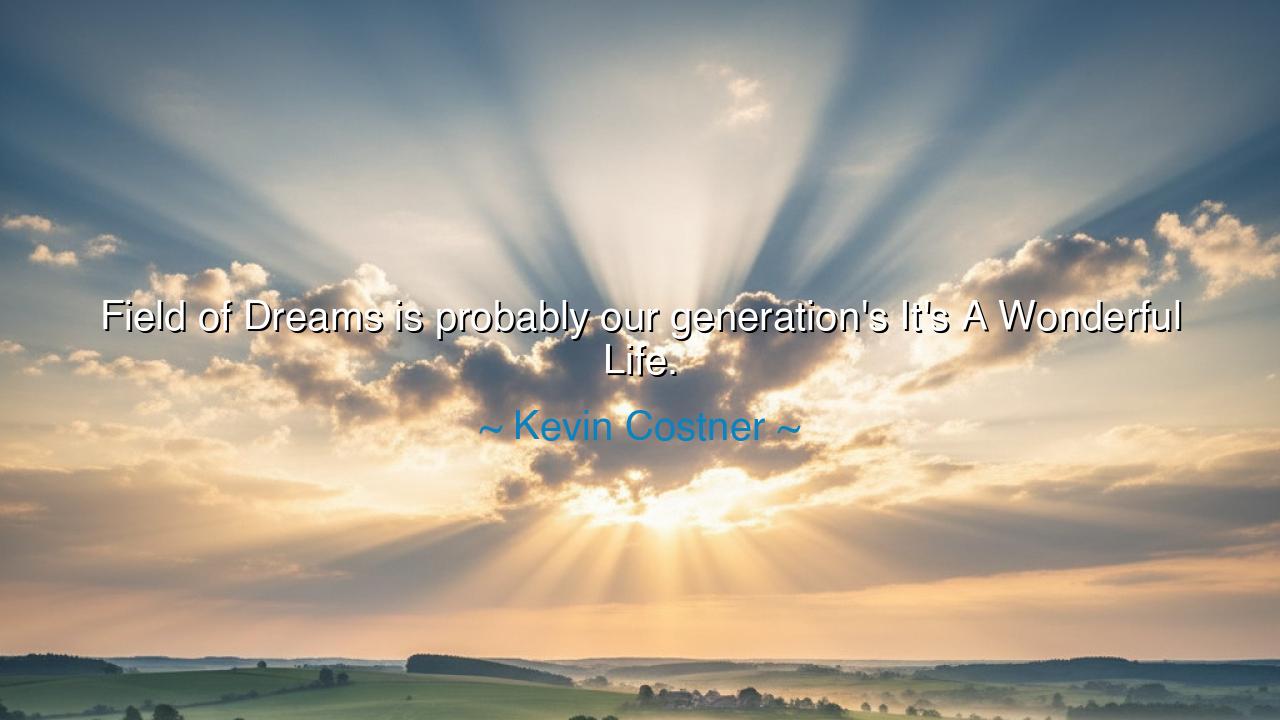
Field of Dreams is probably our generation's It's A Wonderful






The words “Field of Dreams is probably our generation’s It’s a Wonderful Life” were spoken by Kevin Costner, the actor who brought to life one of cinema’s most beloved dreamers. At first glance, this statement seems like a simple comparison between two films. Yet beneath it lies a deep reflection on hope, redemption, and the enduring power of belief. Costner’s words are a recognition that certain stories, rare and timeless, become more than entertainment—they become spiritual mirrors for the generations that behold them.
To understand the meaning of this quote, one must understand both films. “It’s a Wonderful Life” (1946) tells the tale of George Bailey, a man who, in despair, is shown the worth of his existence through divine intervention. “Field of Dreams” (1989), by contrast, speaks of Ray Kinsella, a man who hears a mysterious voice whisper, “If you build it, he will come.” Both stories revolve around faith—faith not bound to religion, but to the human heart’s yearning for meaning. When Costner calls Field of Dreams his generation’s It’s a Wonderful Life, he is proclaiming that every era needs a tale that restores belief in the unseen, that reminds us that love and purpose exist even amid doubt.
In both stories, the supernatural acts not as fantasy but as revelation. The angels of It’s a Wonderful Life and the ghostly ballplayers of Field of Dreams are symbols of grace—of the unseen forces that move through ordinary lives. Each protagonist is an everyman, burdened by disillusionment, yearning to reconcile with the past. George Bailey learns that life’s worth lies not in wealth or adventure, but in love and community. Ray Kinsella learns that forgiveness and reconciliation—especially with one’s father—heal the soul. Thus, Costner’s quote reminds us that the miraculous often appears disguised in the ordinary, and that those who listen to the small, inexplicable voice within may uncover truths greater than reason can comprehend.
Throughout history, great storytellers have understood this sacred thread that ties imagination to faith. Homer’s Odysseus, like Bailey and Kinsella, wanders through trials that test his heart more than his strength. His journey, too, ends in homecoming—proof that the truest voyage is inward. Costner’s reflection places Field of Dreams within this eternal lineage of stories that redeem the weary soul. It is not simply about baseball or ghosts, but about faith in love, trust in mystery, and the courage to act when logic says no.
What Costner calls his generation’s It’s a Wonderful Life speaks also to the spiritual hunger of the modern age. In a world often ruled by cynicism and speed, Field of Dreams offered a quiet parable: that to build something—whether a field, a dream, or a life—out of pure faith is to create a bridge between heaven and earth. It is a reminder that miracles favor the open-hearted, and that even the smallest act of belief can ripple through eternity.
Costner’s statement, therefore, is not only about film—it is about the power of stories to save the human spirit. Every generation needs its guiding myth, a tale that whispers: “You matter. Love endures. Dreams are real.” For the people of the mid-20th century, that myth was George Bailey’s. For the people of the late 20th century, it was Ray Kinsella’s. And for every soul that listens today, it remains the same—hope reborn through the telling.
Let this, then, be the lesson: listen to the quiet voice within, the one that speaks of forgiveness, of creation, of impossible dreams. Build what your heart commands you to build, even when reason mocks you. Believe that love transcends distance, that the past can be healed, that wonder still walks the earth. For as Kevin Costner reminds us, every age needs its Field of Dreams—a vision to awaken faith where doubt has taken root, a reminder that the invisible is often the most real thing of all.






AAdministratorAdministrator
Welcome, honored guests. Please leave a comment, we will respond soon